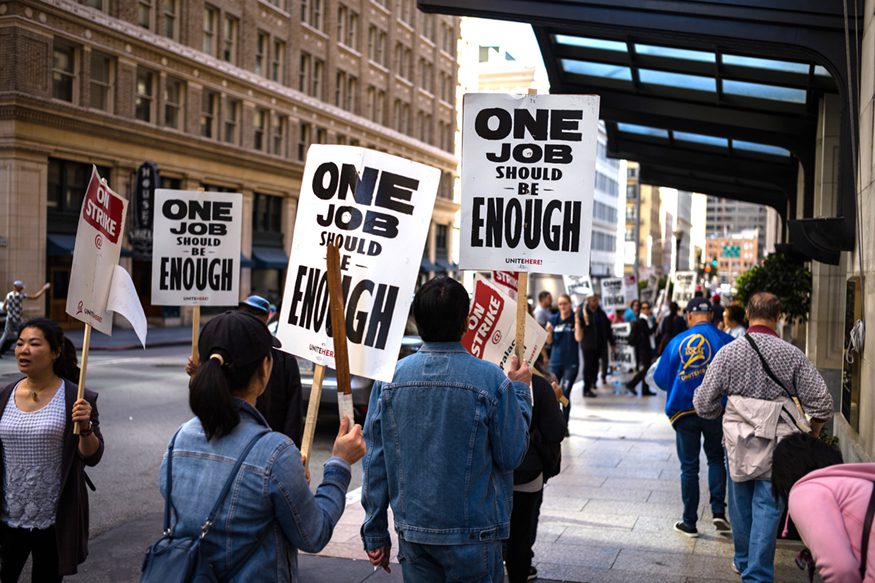By Michele Learner
It’s been all over the media, complete with nicknames (“The Great Resignation”) and hashtags (#striketober). There’s been a significant increase in workers voting to go on strike, breaking a lull in union-organized strikes in the United States that has lasted since the 1980s. Those on strike are workers in a variety of occupations and geographical locations. Meanwhile, far more people than usual have left their jobs—more than 3 million in October alone. This too indicates a broader dissatisfaction with work and workplaces as they are today.
Bread for the World emphasizes that while we champion critically important nutrition programs such as SNAP and other efforts designed to enable people to put food on the table, ending hunger in a lasting, sustainable way calls for a different, wider “lens”—identifying the causes of hunger and how government policies can help resolve these problems.
There is no question that lack of jobs that pay a living wage is a major cause of hunger in our country. Not only is it possible to work full-time, year-round and end up with an income that is $4,000 less than the federal poverty line, but many people hold such jobs.
The pandemic and its impacts—including some that are still unfolding and even more that are not yet well understood—have opened national discussion of work and the assumptions people have had about work. Another source of fuel for public debate is the months-long negotiations in Congress over the administration’s twin legislative proposals. Information and speculation about their specific content often changes from one day to the next, but experts have described the impacts of this legislation as “transformative” in areas that affect workers, particularly working parents. Everything from access to public transportation to universal pre-K to high-speed Internet in rural areas affects people’s daily lives and their job productivity.
Beyond those two bills, ending hunger in a lasting way calls for other measures, many on issues on which Bread members have been and are active advocates. Examples –just a few of many–include legislation that would raise the minimum wage, impose harsher penalties on companies that unlawfully interfere with workers’ efforts to organize, and strengthen enforcement of current law on sexual harassment.
The 2018 Hunger Report, The Jobs Challenge, contains some information on wage stagnation and rapid increases in income and wealth inequality that I found a bit surprising even though I work on these issues! For “the 99 percent,” incomes have fallen over the past 40 years when adjusted for inflation. A costly tax cut in 2017 funneled 83 percent of its benefits to the top 1 percent in income. Recent media coverage has made many more Americans aware of the fact that many of our largest businesses pay very little, sometimes literally nothing, in taxes.
Although I know that people are rarely persuaded by “just the facts,” I couldn’t help wondering when more people would hear even a little about policies that affect their economic well-being and decide to take action. Speaking from my own personal opinion, the facts on some of these issues—minimum wage, worker safety violations, the impacts on everyone in the entire country when the very richest people don’t pay their fair share of taxes, to name just a few—truly are outrageous.
No one fully understands why some events lead to powerful social movements and/or legislative change, while others that appear similar seem to pass by almost unnoticed. The social sciences aren’t science, in the sense of following known principles such as the law of gravity, because they involve human beings. Perhaps the highly unusual confluence of events of the past couple of years are serving as a call to action to protect and then strengthen our democracy and the rights of all people to be able to feed themselves and their children. Experts on some of the topics in the news, such as workers on strike or billionaires’ tax rates, have said they cannot predict where all of this will lead. We do know that Bread members are doing their part to raise awareness and explain that advocacy is powerful and need not be intimidating.
Michele Learner is managing editor of policy analysis & coalition building with Bread for the World.



